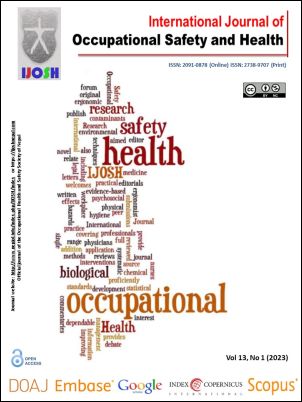Morbidity profile of migrant workers attending health camps in Bangalore urban during the Covid-19 pandemic
DOI:
https://doi.org/10.3126/ijosh.v13i1.43081Keywords:
Health camp, lockdown, migrants, urban underprivileged areaAbstract
Introduction: Global pandemic of COVID-19 resulted in a nationwide lockdown which affected the migrants in terms of healthcare service accessibility. This led to an increase in the prevalence of various morbidity. The objective of this study was to assess the morbidity profile of camp attendees in Bangalore urban conducted during the lockdown period of the COVID-19 pandemic.
Methods: During the pandemic lockdown, health camps were conducted in selected urban underprivileged areas of Bangalore city targeting the migrant workers and these records were reviewed and relevant data were analyzed. Variables included age, gender, residential address, occupation, and morbidity.
Results: Among the 484 participants who had attended the medical camp, the youngest patient was 1 year old and the oldest was 75 years with a median age of 27 years (IQR: 20 – 35). The majority of the camp attendees were males (78%) and migrants (77%). Common morbidities noted were hypertension (5%) followed by musculoskeletal pain (4%). The other illnesses were anemia (3%), gastritis (2.5%), pre-diabetes (1.7%) and combined diabetes and hypertension (1.5%). There was no significant relationship between migrant status and the presence of any morbidity.
Conclusion: Hypertension and musculoskeletal pain are the most common morbidity among camp attendees.
Downloads
Downloads
Published
How to Cite
Issue
Section
License
Copyright (c) 2023 Chippagiri Soumya, Sakthi Arasu, Naveen Ramesh, Ramakrishna Goud, Bobby Joseph

This work is licensed under a Creative Commons Attribution-NonCommercial 4.0 International License.
This license enables reusers to distribute, remix, adapt, and build upon the material in any medium or format for noncommercial purposes only, and only so long as attribution is given to the creator.





